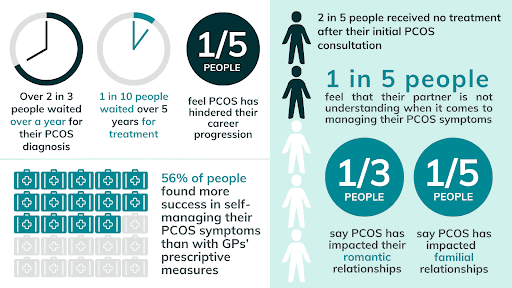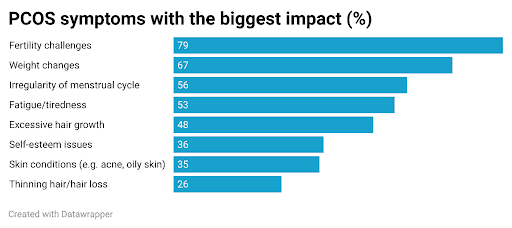If using this data, please credit with a reference link to PCOS supplement provider, Fertility Family or a link back to this report page.
As one of the most common hormone disorders in the world, polycystic ovary syndrome (PCOS) affects an estimated 1 in every 10 women. It often (but not always) involves multiple small follicles that present as cysts just beneath the surface of the ovaries.
It’s a complex health condition that can have a notable impact on physical health, mental health, relationships and family. In a bid to shed light on the multifaceted dimensions of PCOS, we conducted a survey, delving into the experiences of those affected by this condition.
In recognition of PCOS awareness month, we have conducted a survey with our PCOS community. Through this, we have gained valuable insight into the emotions that accompany PCOS treatment and diagnosis, including the impact of long waiting times. We’ve also examined the long-term effects PCOS has on mental health, physical health, and relationships with others.
Our survey highlights the often unspoken challenges faced within the community and the disheartening instances of mistreatment by professionals. Our Fertility Family survey gathered insight from 180 UK respondents whose experience of PCOS has impacted their everyday lives.
But first, what is PCOS?
Polycystic ovary syndrome, commonly known as PCOS, often comes with a high number of small follicles, resembling cysts, situated just beneath the ovary’s surface. These underdeveloped follicles contain eggs.
However, the name can be misleading as it suggests that polycystic ovaries are the root cause whereas, in actuality, they’re a related symptom of PCOS. A PCOS diagnosis can be established even in the absence of ovarian cysts. This is due to the syndrome including a wide variety of symptoms, of which polycystic ovaries are merely one element. It’s important to note that in instances where ovulatory disorders and hyperandrogenism are present, a PCOS diagnosis can be made, even in the absence of polycystic ovaries.
There are approximately 35,158,267 women in the United Kingdom. Based on the most recent data, this equates to over 3 million people affected by PCOS in the UK alone. Despite this, the precise cause remains uncertain among scientists. While no definitive cure exists for PCOS, numerous treatments are available to aid women in managing the condition.

Key findings
- 2 in 5 people (39%) received no treatment after their initial consultation
- Over 2 in 3 people waited over a year for their PCOS diagnosis
- 1 in 10 people waited over 5 years for treatment, with 7% waiting over 10 years
- 56% of people found more success in self-managing their PCOS symptoms than with GPs’ prescriptive measures
- Fertility challenges were the most impactful symptom (affecting 4 in 5 women), followed by weight changes
- 1 in 5 people feel PCOS has hindered their career progression
- 1 in 3 people say PCOS has impacted their romantic relationships, with a further 1 in 5 citing effects on familial relationships
- 1 in 5 people feel that their partner is not understanding when it comes to managing their PCOS symptoms
PCOS diagnosis and treatment: a waiting game
Whilst PCOS impacts up to 10% of women of childbearing age, it’s a condition that often goes undiagnosed. This is usually because the symptoms can be indicators of a variety of different conditions and can vary dramatically from person to person.
Our survey found that 2 in 3 people (68%) waited over a year for their formal diagnosis, with 1 in 12 (9%) still awaiting one. The results revealed that those between the ages of 35-44 were most likely to suffer long waits, with almost half waiting 3 or more years for their symptoms to be correctly diagnosed as PCOS.
Of those surveyed, only 25% received a diagnosis before the age of 21. Lengthy wait times can have a huge impact on both physical and mental health. Additionally, the stigmas surrounding topics such as menstrual cycles and weight gain are often discouraging for individuals wanting to seek help, further prolonging the time it takes to receive a diagnosis.
Treatment troubles
After jumping that first hurdle and seeking out a formal diagnosis, women with PCOS will often want to discuss the next steps with a medical professional. However, our survey found that whilst over a quarter (29%) of people were treated within a year, a shocking 2 in 5 (39%) people received no treatment after their initial consultation.
Looking further into the data, 1 in 10 people had to wait over 5 years to receive any treatment at all, whilst 7% of respondents waited over 10 years for treatment.
More people (42%) were diagnosed between the ages of 25 and 34 than at any other stage of life.
Professional attitudes
With PCOS comes a certain degree of stigma, which can feel like an added weight to those suffering in silence – on top of symptoms that are already difficult to navigate alone. This can leave those dealing with PCOS feeling somewhat at fault for elements of their condition that may be difficult to control, such as weight changes.
According to our survey, over half (54%) of the respondents have felt misunderstood by health professionals during appointments concerning PCOS. A further 10% felt that, in actuality, receiving a prescribed treatment from a GP has had a negative impact on their life. Somewhat surprisingly, 56% of people found more success in self-managing their PCOS symptoms than with GPs’ prescriptive measures.
This level of misunderstanding can lead to feelings of shame and isolation, so it’s crucial that efforts are made to break down the stigma surrounding this condition. Women with PCOS need a supportive environment where they can find validation and care.
PCOS symptoms: discovering the most pressing elements
Symptoms of PCOS vary depending on the person experiencing them, with no two cases looking exactly alike. However, some are more prevalent than others. According to our survey, the following symptoms have the biggest impact on the lives of those living with the condition.

When discussing PCOS, the impact on fertility is undoubtedly a conversation that will arise. Our survey found that a large proportion of respondents felt that fertility challenges were among the most significant symptoms of PCOS. Of those who had begun trying to conceive, 60% started trying when aged 25-34. This age coincides with when most respondents (42%) received their formal diagnosis.
The next most impactful symptom was weight changes. Due to hormonal imbalances, PCOS makes it harder for the body to use insulin, which enables the body to convert starches and sugars from food into energy. As a result, approximately half of women with PCOS are considered ‘overweight’, which carries a huge amount of stigma. It comes as no surprise, then, that almost 3 in 5 people (59%) have felt judged for PCOS-related weight difficulties.
As only about 20% of women with PCOS ovulate, it can be difficult to track a regular menstrual cycle. Another factor is that people with PCOS will often experience either amenorrhea (a lack of menstrual periods) or very heavy periods. As a result, ‘irregularity of menstrual cycle’ came third in terms of its effect, with over half of all respondents finding this symptom among the most impactful.
Also found in the top results were fatigue, excessive hair growth and self-esteem issues – making it clear that women with PCOS have much to contend with.
PCOS and relationships
Whilst polycystic ovary syndrome can have a profound effect on someone’s physical health, the impact of the condition goes beyond the medical environment and touches many more elements of people’s lives. These include their relationships with family, friends and partners, which can also be affected by associated mental health issues.
Our survey found that 1 in 3 people (32%) felt having PCOS had a negative impact on their romantic relationships, with a further 1 in 5 citing impacts on familial relationships.
Waiting for a PCOS diagnosis was also highlighted as a cause of relationship trouble, as 33% of respondents found it had put a strain on their romantic relationships. In addition, 1 in 5 (20%) people feel that their partner was not understanding when it came to managing their PCOS symptoms – highlighting the importance of education surrounding the condition.
Me, myself and I: the impact of PCOS on mental health
The mental health impact of PCOS is an often overlooked symptom. We asked our community whether having PCOS had made their relationship with their body more difficult, to which almost 9 in 10 (87%) said it had. Plus, a huge 86% agreed that this was one of the most prominent day-to-day PCOS difficulties they experienced.
Also, 7 in 10 people felt that having PCOS had a negative impact on their self-esteem. Self-esteem issues can also lead to feelings of isolation, depression and anxiety. If left untreated, such feelings can have a huge impact on every aspect of people’s lives.
This survey highlights the need for greater PCOS awareness – to pave the way for a greater understanding of the condition, leading to more compassion towards those who struggle with it. Plus, it serves as a reminder that underneath the surface of a somewhat ‘silent’ condition lies a complicated range of experiences and emotions that each person feels differently.








